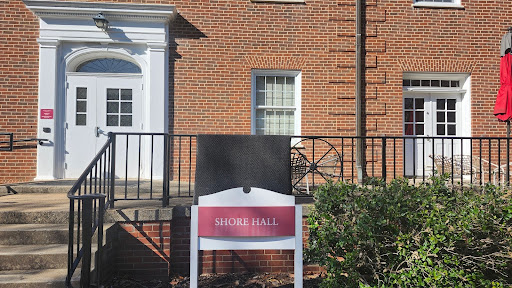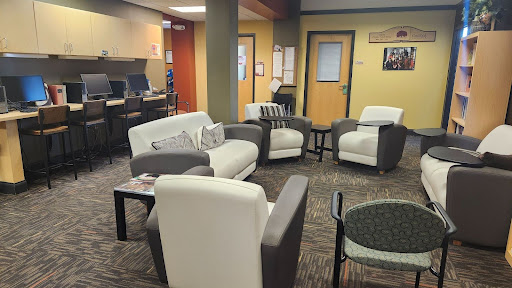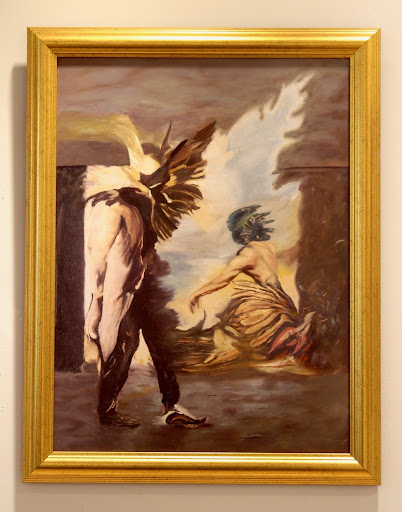“True movements need to be woven in a fabric that gives the oppressed majority’s needs priority over individual wants,” said Kristi Matthews ’06 during her keynote address. “Think of ways to fight oppression, engage your community and find ways to act on vision.
“The first step to dismantling oppression and improving society is to transform the way we think about activism.”
Students, faculty, staff, alumni and community members alike joined together in discussions and workshops for the All Black Everything Symposium.
On Feb. 19, the Multicultural Education Department, Blacks Unifying Society, Community Senate and the Multicultural Leadership Scholars Program sponsored the event.
This symposium aimed to celebrate Black History Month on Guilford College’s campus by allowing all community members to share their works of art and other media of black culture and black history.
The symposium started with an opening ceremony and speech from keynote speaker and speaker Matthews in the Community Center, followed by two workshops of presentations and workshops throughout campus and finished with a closing reflection in the East Gallery of Founders.
The workshops were designed to ignite social change through activism and integrity.
Workshops and presentations included “Police Accountability and Real Justice” by Associate Academic Dean Barbara Lawrence, “African Activism in the U.S.” by junior and MLSP scholar Yves Dusenge, “Food for Thought: Race, Gender and Eating Disorders” by senior and MLSP scholar Yashua Clemmons and “Creating Movements Instead of Moments: How to Have a Successful Advocacy Campaign Against Oppression” by Matthews and Kyri Murdough ’06.
The All Black Everything Symposium was created to give people of color and community members the ability to come together to share and learn from each other.
“It’s great to see black alumni on campus and more information about black life on campus,” said sophomore Nara Seymour. “It was interesting and good to hear others’ experiences and their struggles.”
Alumni returned to Guilford to re-launch their idea of “Table Talks,” during the 10th anniversary of the event. This year’s theme was “Activism and Integrity: On The Road to Social Change.”
Table Talks were used to break up the two workshop sessions. In the cafeteria during lunch, students were asked to join a table and join in on a group discussion. These discussions were facilitated by trained students and focused on race and oppression. Staff in the cafeteria estimated about 150 to 200 students participated.
Murdough and Matthews stood at the front of the cafeteria asking everyone who entered to participate. Murdough reflected on her experience of feeling empowered:
“A younger white student came in and asked ‘what is all this about?’
“I told him it was about race and systems of oppression. He got really nervous and said that he simply didn’t know how to talk about race.
“I reassured him this was the place to practice and try in a safe space.
“After hearing (from other students) all day ‘if you don’t talk about it, it doesn’t exist,’ the fact that that one kid, who looked like he was going to start crying because he was so nervous after hearing the words race and oppression, sat down anyway and tried.”
Students were armed with the knowledge and power to make long-term changes at Guilford and in their communities through the workshops and the symposium as a whole. Many faculty and staff were present to share their experience and to learn from the stories of others.
“The students in the room were so present and seemed to be so interested,” said Matthews.
The symposium touched on where alumni are today in their careers and their connections to Guilford.
“It’s important to see that these experiences can also shape what I do in my career and (help me see) how the alumni have incorporated what they learned at Guilford into their individual paths,” said Matthews. “It was very special for me to experience that and to feel another sense of home and pride.”
Participants left with a better understanding of lived experiences from the symposium. The closing ceremony came with a call to action and to think of the action steps for tomorrow and beyond.
Steps to continue discussions, Table Talks and programs have already sparked from this event.
“You could feel the urgency in the room, and I want to do all that I can to continue that momentum,” Murdough said.












